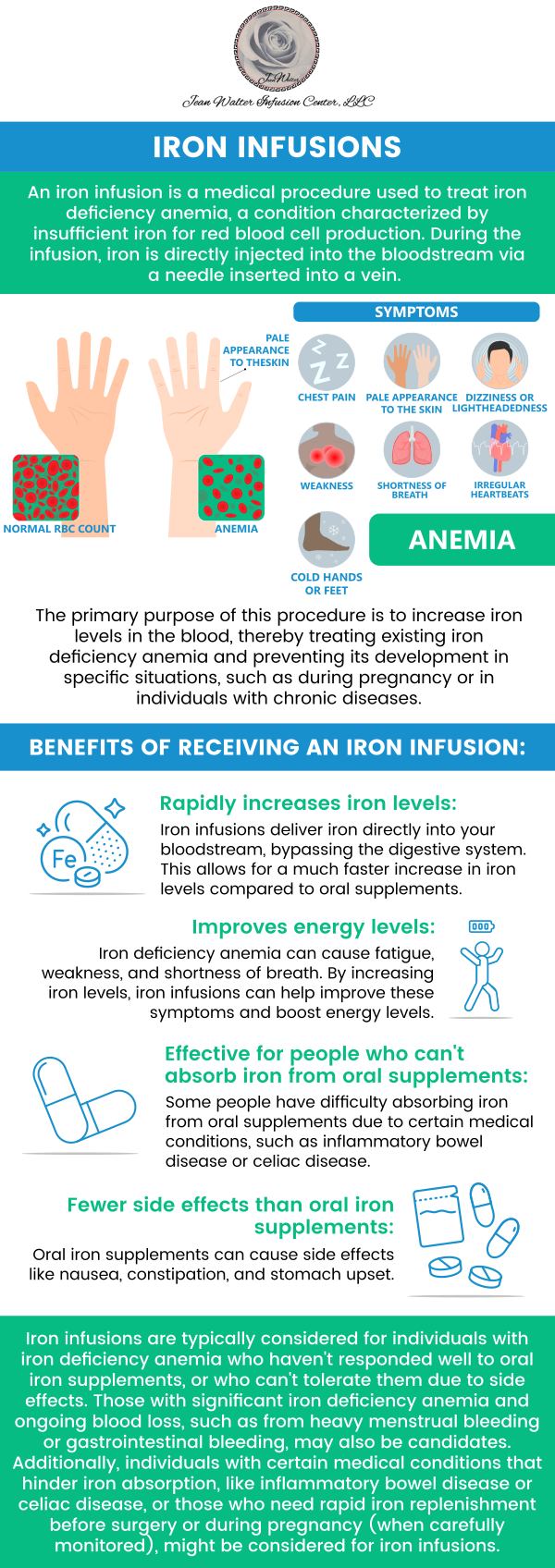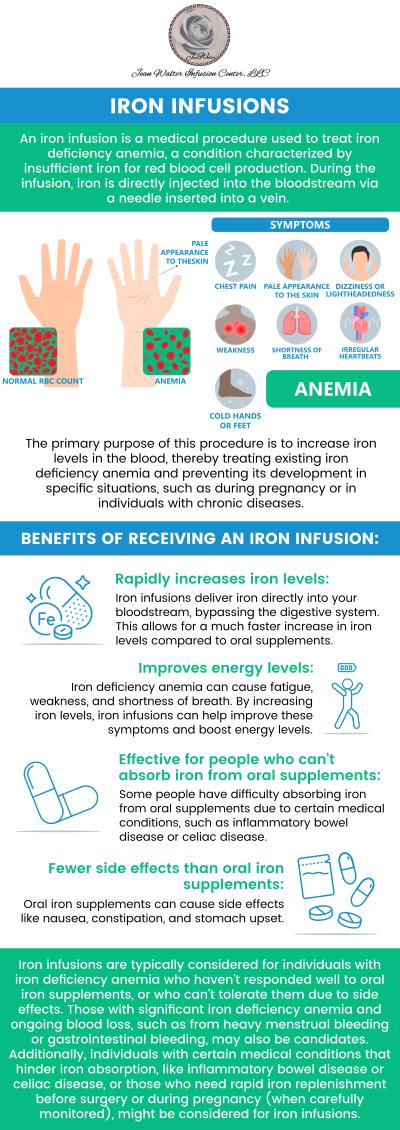How Do Iron Infusions Help Treat Anemia?
Iron infusions treat anemia by delivering iron directly into the bloodstream, quickly replenishing the body’s iron stores. They are especially useful for individuals who cannot absorb iron from oral supplements or need a rapid increase due to severe deficiency. By restoring iron levels, infusions help produce healthy red blood cells, improve oxygen transport, reduce fatigue, and boost energy. Always consult healthcare professionals to determine if iron infusions are suitable for your condition. For more information, contact us or book an appointment online. We have convenient locations to serve you in Edgewater, Rosedale, Columbia, Glen Burnie, North Baltimore, and Catonsville MD.


Table of Contents:
What is anemia, and how does it affect the body?
How do iron infusions work to increase iron levels in the blood?
When are iron infusions recommended over oral iron supplements for anemia?
How quickly can iron infusions improve anemia symptoms?
How long do the benefits of iron infusions typically last?
Why choose Iron Infusions with Dr. Nasser Nasseri?
Anemia is a common health condition affecting many of our patients, particularly those undergoing treatments or managing chronic illnesses. Anemia occurs when the body has a lower-than-normal count of red blood cells or hemoglobin, the protein responsible for carrying oxygen from the lungs to tissues and vital organs. Patients experiencing anemia often suffer from fatigue, weakness, dizziness, pale skin, shortness of breath, rapid heartbeat, headaches, or difficulty concentrating.
Anemia can result from multiple factors. Many of our patients experience anemia due to nutritional deficiencies, such as iron, vitamin B12, or folate deficiencies, or as a consequence of chronic diseases like kidney disease, cancer, or autoimmune disorders. Additionally, anemia may occur following significant blood loss from surgery, gastrointestinal conditions, or heavy menstrual bleeding. Certain inherited conditions, such as sickle cell anemia or thalassemia, can also lead to chronic anemia.
The severity and duration of anemia significantly impact a patient’s quality of life and ability to cope with their medical treatments. Mild anemia may present minimal symptoms, while severe cases can seriously impair daily activities, reduce energy levels, and complicate overall health outcomes. Left untreated, anemia can pose risks to vital organs, weaken immune function, and place additional strain on the heart as it struggles to supply sufficient oxygen throughout the body.
At Jean Walter Infusion Center, our specialized team is committed to accurately diagnosing anemia through comprehensive medical evaluations, including blood tests to measure hemoglobin levels, red blood cell counts, and nutritional status. Our infusion therapies play a critical role in effectively managing anemia, allowing patients to receive intravenous iron supplementation, vitamin B12 and folate replacement, or medications designed to stimulate red blood cell production.
Iron infusion therapy at Jean Walter Infusion Center provides a specialized, patient-centered approach to treating iron deficiency anemia and related conditions. At our facility, iron infusions involve intravenously administering iron directly into the bloodstream, typically through a vein in the arm, under the close supervision of our experienced medical professionals in a comfortable, patient-friendly environment.
By delivering iron intravenously, we effectively bypass the digestive system, overcoming absorption issues commonly associated with oral iron supplements. Immediately after infusion, iron is rapidly transported through the bloodstream to the bone marrow, where it is utilized to produce hemoglobin, the essential protein in red blood cells responsible for carrying oxygen throughout the body. This treatment helps patients achieve healthier red blood cell counts, thereby alleviating iron deficiency anemia and significantly improving symptoms such as fatigue, dizziness, shortness of breath, and weakness.
Iron infusions offered are particularly beneficial for patients who have gastrointestinal absorption difficulties, chronic blood loss, inflammatory bowel diseases, or whose anemia has not adequately responded to oral iron treatments.
Oral iron supplements are often the initial treatment approach to iron deficiency anemia due to their ease of use and cost-effectiveness, however, there are certain clinical situations when oral therapy is insufficient, poorly tolerated, or unable to adequately correct anemia.
Patients with gastrointestinal conditions such as inflammatory bowel disease (Crohn’s disease and ulcerative colitis), celiac disease, or those who have had gastric surgery. These patients often have impaired iron absorption, making oral supplements ineffective. In these scenarios, our experienced clinical team administers intravenous iron infusions that bypass the digestive system entirely, ensuring rapid and reliable iron replenishment.
Additionally, many patients referred have found oral iron supplements difficult to tolerate due to side effects like nausea, constipation, abdominal discomfort, or diarrhea. IV iron therapy alleviates these gastrointestinal side effects, enhancing patient comfort and adherence to treatment.
Our services are also essential for patients with severe iron deficiency anemia who require swift correction of their anemia, such as individuals preparing for surgery, pregnant women facing significant anemia, or patients with chronic kidney disease undergoing dialysis. Intravenous iron infusions can quickly restore iron stores, increase hemoglobin levels, and substantially improve patient outcomes compared to traditional oral iron supplementation.
At Jean Walter Infusion Center, our experienced medical team understands that each patient’s response to iron infusions may vary based on their health status, severity of anemia, and how their body absorbs and utilizes iron. Typically, many of our patients begin noticing improvements in their anemia-related symptoms, such as increased energy, decreased fatigue, and enhanced overall well-being, within several days to one week following their iron infusion.
However, achieving the full therapeutic effect, including normalization of hemoglobin levels and replenishment of iron stores, generally takes a few weeks. This is because your body needs time to effectively use the infused iron to produce healthy new red blood cells. To ensure optimal outcomes, our providers routinely schedule follow-up blood tests several weeks after your infusion. This allows us to monitor your progress carefully, assess the effectiveness of treatment, and determine whether additional iron infusions may be necessary.
Every patient is unique, and individual results can vary significantly. While some patients experience rapid improvements within days, others, particularly those with underlying health conditions affecting iron absorption, may notice symptom relief more gradually. We encourage you to openly discuss your personal situation, progress, and any questions or concerns you may have about the timing of symptom improvement with your Jean Walter Infusion Center healthcare provider.
The duration and effectiveness of iron infusions can vary significantly from patient to patient. Factors such as the severity and underlying cause of your iron deficiency, your iron absorption rate, and your overall health status all play a role in determining how long you will benefit from treatment.
Typically, patients start noticing improvements in their iron levels and symptoms, such as increased energy levels and reduced fatigue, within a few days to a few weeks following their infusion. For many patients, these positive effects can persist for several months up to a year or even longer, particularly when the underlying cause of iron deficiency is effectively managed.
However, some patients experiencing ongoing blood loss, chronic medical conditions, or other persistent factors contributing to iron deficiency may find that their iron levels gradually decline again over time. In these cases, additional infusions or alternative treatments may be necessary.
At Jean Walter Infusion Center, under the professional care of Dr. Nasser Nasseri, MD, patients receive tailored iron infusion therapy designed to replenish low iron levels quickly and safely. When oral supplements are ineffective or poorly tolerated, intravenous iron — delivered directly into the bloodstream — bypasses absorption issues and enables faster restoration of healthy iron stores.
This approach helps improve red blood cell production, boost energy, reduce fatigue, and ease symptoms of iron deficiency or anemia. The team at Jean Walter monitors each infusion carefully — from pre‑treatment blood tests to post‑infusion follow‑up — to ensure safety and optimize results for each individual patient.
For those struggling with anemia, malabsorption, or chronic conditions that impair iron levels, Dr. Nasseri and his skilled staff offer a reliable, patient‑centered treatment path aimed at restoring vitality and improving overall well‑being.
Always consult with our healthcare providers at Jean Walter Infusion Center to determine the most appropriate frequency and approach to iron infusions tailored to your specific condition and personal health needs. For more information, contact us or book an appointment online. We serve patients from Rosedale MD, Edgewater MD, Columbia MD, Glen Burnie MD, Catonsville MD, North Baltimore MD, Parkville MD, Middle River MD, Dundalk MD, Halethrope MD, Ellicott City MD, Laurel MD, Hebbville MD, Woodlawn MD and surrounding areas.
Check Out Our 5 Star Reviews

Additional Services We Offer


- Infusion Therapy
- Injection Treatments
- Intravenous Immunoglobulin Therapy
- Medical Conditions
- Asthma
- Crohn’s Disease
- Fibromyalgia
- Gout
- Inflammatory Eye Disease
- Inflammatory Skin Disease
- Iron Deficiency
- Lupus
- Multiple Sclerosis
- Myositis
- Osteoporosis
- Rheumatoid Arthritis
- Ulcerative Colitis
- Vasculitis
- PRP Injections






